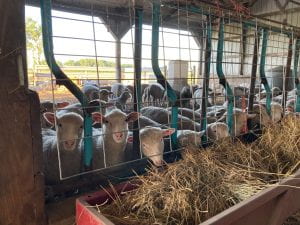Tracking down a corn farmer in October is tough. It’s peak harvest season and if they aren’t in a tractor harvesting corn, they’re likely sleeping. That is, unless it rains. Then the harvest stops and the chances of catching them are pretty good. This is exactly how I was able to schedule a meeting with Richard Syverson, a grain farmer in a small town in western Minnesota.
Heavy rain in the forecast meant Richard and his harvesting team had to pull an all-nighter to finish their last cornfield, but he was happy to talk with me the next morning. Although we spoke over the phone, I could hear the bustling sounds of a kitchen preparing breakfast and the clink of his coffee cup on the table. From what I could hear, his home seemed warm and welcoming. And, as I would learn, if you add a splash of Midwest passive-aggressiveness, you’d get Richard.
Richard’s been a farmer his entire life. He started as a dairy farmer and milked cows until the dairy market crashed in 2003. Now, he farms 1,200 acres of corn and soybeans, along with raising 150 sheep.

Lambs on Richard’s farm

There are not mountains or many lakes where Richard farms, but there is the occasional rainbow
Richard’s passion for farming is still strong. “I’m 65 years old,” exclaimed Richard, “and I’m still fired up about it!” The “it” Richard is most excited about is ethanol, a biofuel made from corn. It’s a major industry in the Midwest and a big source of revenue for many grain farmers. Ethanol also has social and environmental benefits. It provides stability for small farmers and reduces our dependence on fossil fuels.
***
Richard serves as a representative for the Minnesota Corn Growers Association, a position he’s been honored to hold for nearly 20 years. Minnesota Corn Growers Association advocates on behalf of corn farmers across Minnesota. Although that means spending a lot of time in conference rooms, Richard also gets to meet with farmers from across the country.
“What I really really enjoy is the people that I’ve met through corn growers,” Richard told me. “They are some of the greatest people in the world. They absolutely believe that there’s something significant that happens after the product leaves their farm.”
Richard is extremely knowledgeable about what happens “after the product leaves the farm.” And, as I learned, the harvest is only the beginning.
Corn has two potential markets: the grain market and the fuel market. Richard sells about half of his corn into the fuel market via a local ethanol plant, the Chippewa Valley Ethanol Company (CVEC). Having two potential markets is helpful since grain and fuel prices fluctuate annually.

Corn from Richard’s farm: “What we work hard for all year long!”
Having multiple markets for corn helps farmers stay afloat. This is the “best investment we’ve ever made,” Richard said. “When [grain] prices suck, we’re gonna be okay…Gives our farm business more stability.” Ethanol provides an alternative source of income.
Ethanol is a fuel additive, meaning it is blended with gasoline. Most cars already run on a blend of 10% ethanol and 90% gasoline. Yet, there is an ongoing debate about whether or not we should continue blending ethanol into our fuel. The question is whether it is environmentally sustainable.
Corn plants do sequester carbon, but some (the ethanol opponents) argue that growing corn and producing ethanol – because they are so energy-intensive – actually increases greenhouse gas emissions, even though corn is a renewable resource. Over the last decade, many scientists, environmentalists, and even some politicians have strongly supported removing it from our fuel system entirely.
This point of view doesn’t sit well with Richard or the Minnesota Corn Growers Association. Richard thinks cars should use more ethanol as a way to transition away from fossil fuels. He firmly believes that ethanol does have environmental benefits and can play a key role in mitigating the consequences of climate change.
“I call them ‘solar cars’” he said. I was a bit confused by what he meant. My mind rushed to flying cars or even solar panels on top of cars, but I was certain that wasn’t where he was going.
Cars that run on ethanol are, in Richard’s view, running on sunshine captured by the corn. He imagines a world where hybrid cars run on a combination of electricity and ethanol — largely eliminating gasoline consumption.
Ethanol is a controversial topic but ethanol opponents are lacking one key thing. “What they [the ethanol opponents] don’t have are advocates, farmers, [and] small retailers that believe in ethanol…and telling our story directly to our representatives.” The product may make a profit but the people give it meaning.
Richard’s story is just one of many that get pushed to the sidelines of the ethanol debate. These are the rich narratives that signify the importance of ethanol beyond federal policy, market pricing, or environmental debate. These are the types of stories, and people, that deserve more attention.
And as Richard told me, ethanol is just one area of agriculture that is pretty exciting to know about first-hand. Even after decades of farming, it still makes him excited every single day.

Richard and his grandchildren, the sixth generation on their farm.